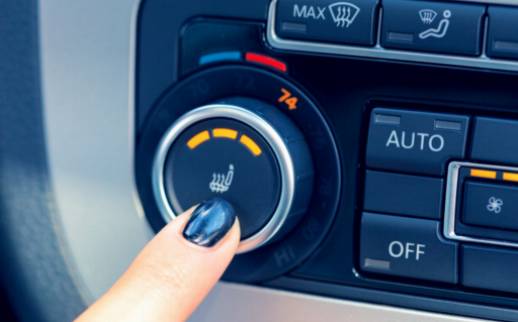The Impact of a Malfunctioning Car Air Conditioning Thermostat on Your Vehicle
22 December 2025 by Macy H.As a writer specializing in car parts and their faults, it is crucial to understand the role of the car air conditioning thermostat in the overall health of your vehicle. A malfunctioning thermostat can have a significant impact on various aspects of your car, from engine performance to fuel efficiency and emissions. In this article, we will delve into the signs of a faulty thermostat, the effects it can have on your vehicle, and important maintenance tips to prevent thermostat failure.

Understanding Car Air Conditioning Thermostats
Car air conditioning thermostats are an essential component of a vehicle's air conditioning system. They help regulate the temperature inside the car by controlling the flow of refrigerant through the system. Thermostats work by sensing the temperature of the air inside the car and adjusting the flow of refrigerant accordingly to maintain a comfortable temperature. There are different types of car air conditioning thermostats, including mechanical and electronic thermostats. Mechanical thermostats use a temperature-sensitive coil to regulate the flow of refrigerant, while electronic thermostats use sensors and computer controls to achieve the same result. Regardless of the type, the thermostat plays a crucial role in keeping the air conditioning system working efficiently and effectively.Signs of a Malfunctioning Thermostat
A malfunctioning car air conditioning thermostat can cause a variety of issues for your vehicle. One of the most common signs of a faulty thermostat is inconsistent cooling in the car. You may notice that the air coming out of the vents is not as cold as it should be, or that the temperature fluctuates unexpectedly. Another sign of a malfunctioning thermostat is if the air conditioning system is blowing hot air instead of cold air. This is a clear indication that there is a problem with the thermostat that needs to be addressed. Additionally, if you hear strange noises coming from the air conditioning system, such as rattling or clicking sounds, it could be a sign of a malfunctioning thermostat. It is important to pay attention to these warning signs and address them promptly to prevent further damage to your vehicle.Effects of a Faulty Thermostat on Engine Performance
A malfunctioning car air conditioning thermostat can have significant effects on engine performance. When the thermostat is not functioning properly, it can cause the engine to overheat or run too cold, leading to inefficiency in performance. This can result in decreased power and acceleration, as well as potential engine damage if not addressed promptly. Additionally, a faulty thermostat can disrupt the engine's ability to regulate temperature, impacting overall performance and potentially causing issues with other engine components. It is crucial to address any thermostat issues promptly to ensure optimal engine performance and prevent further damage.Impact on Fuel Efficiency
A malfunctioning car air conditioning thermostat can have a significant impact on fuel efficiency. When the thermostat is not functioning properly, it can cause the air conditioning system to work harder than necessary, leading to increased fuel consumption. This extra strain on the system can result in the engine having to work harder to maintain the desired temperature, ultimately burning more fuel in the process. Additionally, a faulty thermostat may also cause the air conditioning system to run constantly, further contributing to decreased fuel efficiency. Overall, a malfunctioning thermostat can lead to higher fuel costs and reduced overall mileage for your vehicle.Increased Emissions Due to Malfunctioning Thermostat
A malfunctioning car air conditioning thermostat can lead to increased emissions from your vehicle. The thermostat plays a crucial role in regulating the temperature of the air conditioning system, and when it malfunctions, it can cause the system to run inefficiently. This inefficiency can result in the release of higher levels of harmful emissions such as carbon monoxide and nitrogen oxides into the environment. This can contribute to air pollution and have a negative impact on both the environment and public health. Regular maintenance and prompt repairs of the thermostat can help prevent increased emissions and ensure that your vehicle runs efficiently.Wear and Tear on the Air Conditioning system
The wear and tear on the air conditioning system caused by a malfunctioning thermostat can lead to various issues with the overall functioning of the system. When the thermostat is not working correctly, it can cause the system to overheat or not cool the air efficiently. This can put strain on the compressor and other components of the air conditioning system, leading to increased wear and potential long-term damage. It is important to address thermostat issues promptly to prevent further damage to the air conditioning system. Regular maintenance and inspections can help ensure that the thermostat is functioning properly and prevent unnecessary wear and tear on the system.Maintenance Tips to Prevent Thermostat Failure
To ensure your car's air conditioning thermostat remains in good working condition, it is important to follow a regular maintenance schedule. Here are some tips to prevent thermostat failure:1. Regularly check and replace the thermostat as part of your routine car maintenance schedule.
2. Keep your car's cooling system clean and free from debris to prevent the thermostat from overheating.
3. Inspect the thermostat housing for any signs of wear or corrosion and replace it if necessary.
4. Check the thermostat wiring for any damage or fraying, and replace it if needed.
5. Ensure that your car's coolant levels are always topped up to prevent the thermostat from malfunctioning due to overheating.
6. Have your car's air conditioning system serviced regularly to ensure all components, including the thermostat, are in good working order. By following these maintenance tips, you can help prevent thermostat failure and ensure that your car's air conditioning system continues to operate smoothly and efficiently.